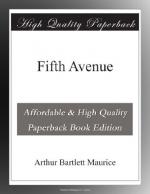A man of literary tastes, or at least a man who wished to be regarded as one of bookish inclinations, Hone seems never to have had any great liking for men of letters as such. All of the gifted and unhappy Poe’s life in New York came within the period of the Diary, but in it is to be found not a single mention of his name. There was no place at the Hone table for the shabby, impossible genius. There was an impassable gulf between the well-ordered household facing the City Hall Park, or at the Broadway and Great Jones Street corner, and the humble Carmine Street lodging, or the Fordham Cottage. Early references to Fenimore Cooper, whom Hone first met at an American dinner to Lafayette in Paris in 1831, are gracious enough, for the creator of Leather-Stocking was a personage, and it suited Hone to stand well with personages. But when, seven years later, Cooper returned to the United States after his long stay abroad, and incurred the displeasure of his fellow-countrymen, Hone was quite ready to join in the hue and cry.
With Washington Irving it was another matter. But who could have failed to feel genial towards the quiet, scholarly, altogether charming gentleman of Sunnyside? Also the legs of Irving fitted well and often under the Hone mahogany, and the part of the author that was perceptible above the table gave a flavour and dignity to the board. Somehow we see Hone’s cheeks puffed out with pride as he chronicles: “My old friend, Washington Irving, who visits his native country after an absence of seventeen years. I passed half an hour with him very pleasantly.” “I have devoted nearly the whole day to Washington Irving.” “Irving and I left them and came to town to meet friends whom I had engaged to dine with me.” “Washington Irving acquainted me with a circumstance, etc.” “We next visited Washington Irving, who lives with his sister and nieces on the bank of the river.” Any one who reads the Diary can see that Hone thoroughly approved of Irving. But just what, in his heart of hearts, did Irving think of Hone?
The Diary gives some significant glimpses of Charles Dickens in America. In 1842 New York welcomed the Englishman riotously. Washington laughed at New York for doing too much and went to the other extreme. John Quincy Adams gave the Dickenses a dinner at which Hone was a guest. “Some clever people were invited to meet them” is the way the ingenuous Hone puts it. “They” (Dickens and Mrs. Dickens) “came, he in a frock-coat, and she in her bonnet. They sat at table until four o’clock, when he said: ‘Dear, it is time for us to go home and dress for dinner.’ They were engaged to dine with Robert Greenhow at the fashionable hour of half-past five! A most particularly funny idea to leave the table of John Quincy Adams to dress for a dinner at Robert Greenhow’s!” Hone referred to the visitors as “The Boz and Bozess,” and described the author of “Pickwick” as “a small, bright-eyed, intelligent-looking young fellow, thirty years of age, somewhat of a dandy in his dress, with ‘rings and things and fine array,’ brisk in his manner, and of a lively conversation”; and Mrs. Dickens as “a little, fat, English-looking woman, of an agreeable countenance, and, I should think, ’a nice person.’”




